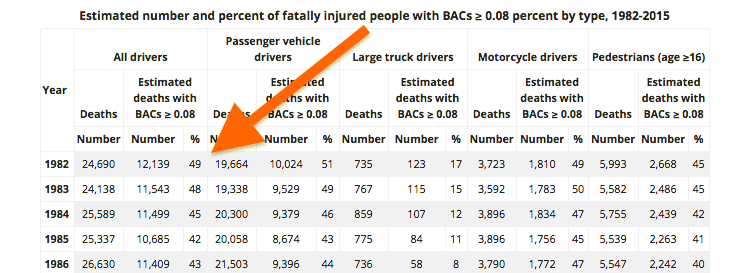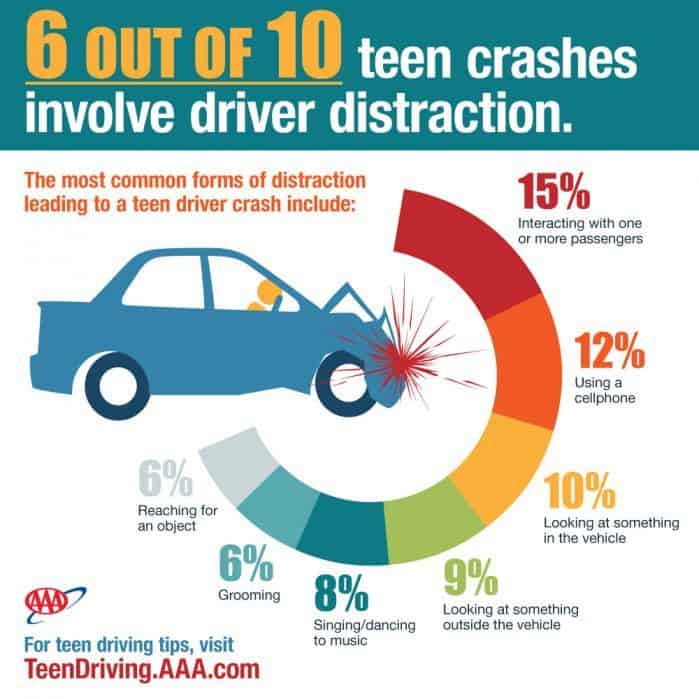Just a couple of decades ago, alcohol was a factor in nearly half of all fatal crashes in the U.S.
Since then, social and legal changes have sliced that number in half.

Even thought it is still far too many senseless deaths, it is a lot of progress. We looked at lessons from drunk driving legislation and change in Part 1.
What can distracted driving opponents do to make similar changes?
How do we reduce fatal distracted driving crashes?
The distracted driving problem didn’t originate with cellphones. It just become much more widespread and obvious.
Distracted driving laws may be necessary, but the history of drunk driving legislation showed us that they are not sufficient. Chances are, driving is the most dangerous thing you do on a daily basis.
I think we need to ask some fundamental questions.
– Do we start driving too early?
Should only legal adults be permitted to drive, at least outside of rural areas?
60% of teenage drivers involved in car crashes were distracted in someway, according to a AAA study.

Knowing the rules of the road, and knowing how to drive, are two very different things.
Should the behind-the-wheel test be more comprehensive? Is distraction even measurable in that context?
– What kind of penalties and enforcement would be most effective?
States have been experimenting with distracted driving laws surrounding mobile device use. 95% of Americans own a cellphone; 77% have a smartphone.
Laws have not been able to keep up with technological changes.
Washington and Oregon are both considering new legislation; see Lawmakers Searching for a Practical Solution to Distracted Driving.
– It is possible to change how we think about driving?
Americans have a somewhat distinct and romantic relationship with cars and driving, the open road and idea of freedom of movement. Driving is more than just a way to get from point A to point B.
Chances are, driving is the most dangerous thing you do on a daily basis.
– Are we too reliant on cars?
One way to reduce distracted driving crashes is just to reduce the number of drivers.
Reliable public transportation options are limited in many parts of the country. Biking and walking only work for limited distances, and can be dangerous, too. Even bike-friendly Seattle is primarily designed for cars: biking and walking paths are often afterthoughts.
– Finally: can we stop expecting people to be accessible at all times?
I’m a trial lawyer: people expect me to respond immediately to calls, texts, and emails. And I am often guilty of expecting the same from other people.
Could we adjust our expectations to allow people to drive safely?
We (probably) can’t fully eliminate driver distraction. Not by phones, or by anything else. (Not too long ago, I represented someone who almost died because a distracted trucker was gazing out the window at a mountain.)
And there is no perfect solution to preventing distracted driving crashes and deaths.
Maybe we have been somewhat insulated by vehicle safety laws.
Maybe it’s that we’ve come to expect a certain amount of road carnage. That is absurd. If tens of thousands of Americans died in terrorist attacks on U.S. soil, we would all get angry. We would demand change.
We can do better.
We can start now.
Think about this: what can you do to make real, positive change?
- Take this opportunity to become a more focused driver.
- Set an example for your kids, your family and friends.
- Stop calling distracted driving crashes “car accidents.” These collisions are not accidents at all, but 100% preventable.
Learn more about distracted driving prevention at the National Safety Council; or at EndDD.org.



